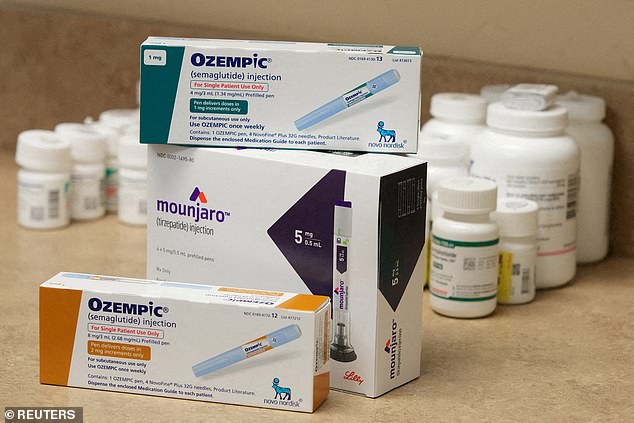Experts have warned that blockbuster jabs like Ozempic and Mounjaro can raise the risk of depression and suicidal thoughts, potentially leaving patients ‘dying to lose weight‘.
The medicines could disrupt levels of a mood-regulating called dopamine in vulnerable individuals, a study by international researchers suggested.
The findings come as The European Medicine’ Agency launches a review of the family of drugs, called GLP-1 agonists, following reports of adverse psychiatric events, including suicidal thoughts.
Senior author of the new study, psychopharmacologist Dr Kennneth Blum, said: ‘This study should not be ignored.
‘We urge the clinical prescribing community to proceed with caution to avoid another tragic wave of people dying to lose weight.’
Millions of dieters in Britain are fans of the jabs, with studies suggesting at least one in 10 women use them.
The medicines help patients to lose weight by mimicking naturally-produced hormones that make us feel full, dramatically reducing appetite.
While studies have found them to be highly effective at aiding weight loss – and reducing the risk of heart attacks and stroke – researchers have raised the alarm about other concerning side effects.
Complications have included stomach paralysis, dangerous inflammation of the pancreas and vision loss, among other issues.

Glucagon-like Peptide-1 (GLP1) receptor agonists — the powerful ingredients behind Wegovy and Ozempic — have long been hailed a monumental breakthrough in the war on obesity and type 2 diabetes.
In March, an eight-year long study of 160,000 obese patients found those taking the drugs had nearly treble the normal risk of depression and double the risk of anxiety, as well as three times the risk of suicidal behaviour, compared with people who weren’t on the drugs.
The latest analysis, led by 24 researchers across the United States, Brazil, Iran, and Israel, found long-term use of these drugs could disrupt signals sent by dopamine in the brain, potentially leading to depressive symptoms.
Commonly referred to as the happiness hormone, dopamine is a neurotransmitter that plays a crucial role in the brain’s pleasure and reward systems.
In the paper, published in the journal Current Neuropharmacology, scientists examined the DNA of individuals with hypodopaminergia – a condition characterised by reduced dopamine activity in the brain.
Using computer simulation software, the researchers studied the interaction between GLP-1 agonists and genes associated with dopamine signaling, including DRD3, BDNF and CREB1.
They found that GLP1 receptor antagonists can disrupt the levels of dopamine in those with genes that reduce the activity of dopamine.
This imbalance, they concluded, may increase the risk of depression, anxiety and suicidal ideation.
The researchers are now urging clinicians to consider genetic tests to better protect individuals who are at a high risk of developing depression whilst taking the popular weight loss drugs.
Professor Panayotis K. Thanos of Buffalo University commented: ‘Before prescribing GLP1 receptor agonists, it would be prudent to use genetic testing tools to assess a patient’s dopamine function and risk profile.’
‘While GLP-1 receptor agonists hold promise, we must remain vigilant about their potential harm.
‘This study is not intended to break the bubble of hope but to add a layer of precaution in their over-prescription,’ Professor Igor Elman of Harvard University added.
Wegovy carries a depression warning on its label.
This article was originally published by a www.dailymail.co.uk . Read the Original article here. .

